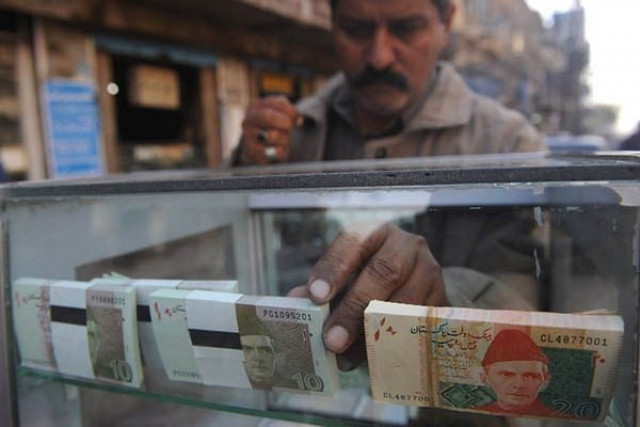Rupee plunges to 143.5 in open market
Decline comes on speculation the currency will settle at Rs145 before IMF deal

A vendor arranges 10 and 20-rupee Pakistani bank notes in a display shelf at a commercial area in Karachi. PHOTO: AFP
The Exchange Companies Association of Pakistan (ECAP) reported that the rupee lost another Rs1.20 against the US dollar and closed at a new record low of Rs143.50 in the open market.
Dollar East Exchange Company reported that the rupee hit an intra-day low of Rs144 during the day.
The downtrend came after the rupee cumulatively lost Rs2.25, or 1.6%, in the inter-bank market in the past three weeks and closed at an all-time low of Rs140.78 on Friday - the last working day of the week.
“The trend over the past three weeks suggests the rupee will maintain its downturn in the inter-bank market in the next week as well…and that is why it hit a new low of Rs143.50 in retail on Saturday,” ECAP General Secretary Zafar Paracha told The Express Tribune.
“There is speculation in the market that the rupee will settle at around Rs145 by the time Pakistan strikes a loan agreement with the IMF,” he said.
The developments suggest Pakistan will formally sign the loan agreement late in April as the IMF’s staff-level mission will arrive in the third week of the month. Discussions will also take place during spring meetings of the IMF and World Bank in Washington during the month, Finance Minister Asad Umar said this week.
Besides, banks have been demanding full payment in advance from importers for opening letters of credit (LC) for the past two to three weeks. The situation created speculative demand for dollars in the market and contributed to depreciation of the rupee, he said.
Pakistan is facing a shortage of dollars that are needed to continue to make international payments mainly for imports and debt servicing. Apart from this, an upward trend in oil prices in world markets has also mounted pressure on the rupee because the country heavily relies on imports to meet its energy needs.
Speculations die down
Pakistan Forex Association President Malik Bostan said the retail market received increased demand for dollars from individuals in first half of Saturday on speculation of further weakness of the rupee. However, the demand shrank notably by the time retail counters closed for the day. Accordingly, the rupee closed at 142.50 against the US dollar.
“The drop in demand for dollars during the closing hours suggests the speculation about further rupee depreciation has come to an end,” he said. “However, what would be the dollar rate in retail on Monday and later during the week would largely depend on the trend in the inter-bank market.”
“Currency dealers received very little demand for dollars, estimated at about $50,000, on future counters on Saturday compared to a high demand for around $3-4 million in the days when chances for further rupee weakness were high,” he said.
Gold at new high
The depreciation of the rupee prompted jewellers to increase gold prices by Rs250 per tola (11.66 grams) to a new record high of Rs70,550 on Saturday.
The surge in the domestic market came despite decrease of $2 per ounce (31.10 grams) to $1,292 in the international market.
An office-bearer of the All Sindh Saraf and Jewellers Association said they had increased the price to adjust the rupee depreciation. Otherwise, there was almost no demand for gold due to a significant price increase in domestic markets.
Published in The Express Tribune, March 31st, 2019.
Like Business on Facebook, follow @TribuneBiz on Twitter to stay informed and join in the conversation.



















COMMENTS
Comments are moderated and generally will be posted if they are on-topic and not abusive.
For more information, please see our Comments FAQ